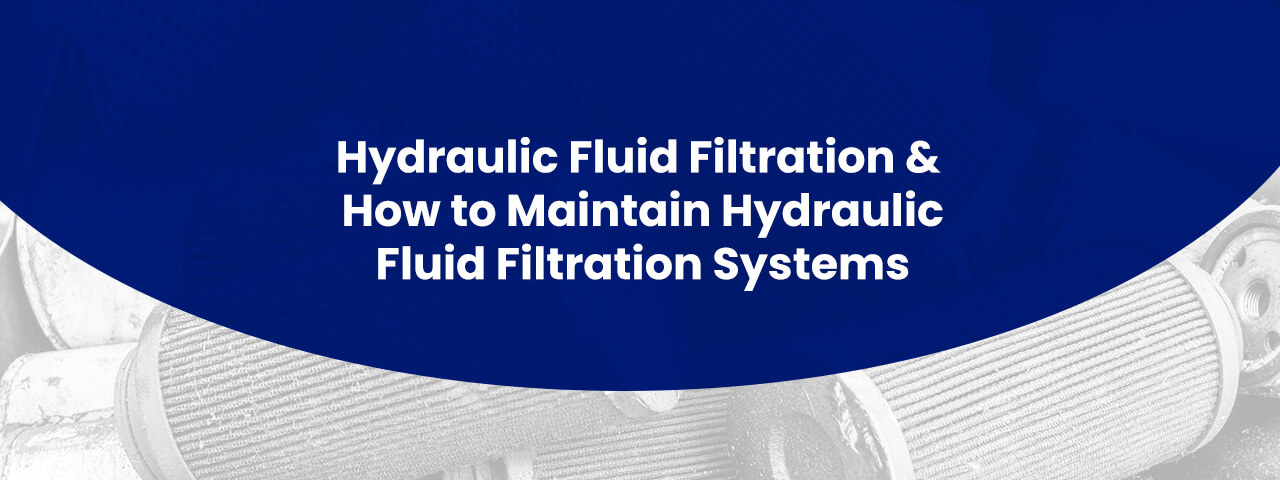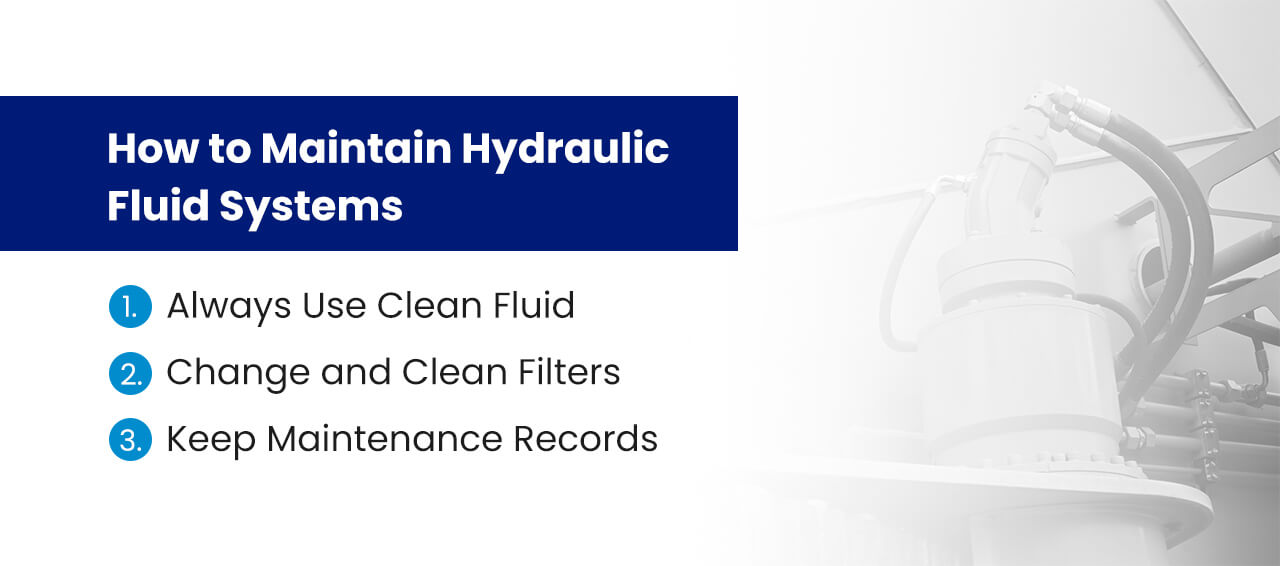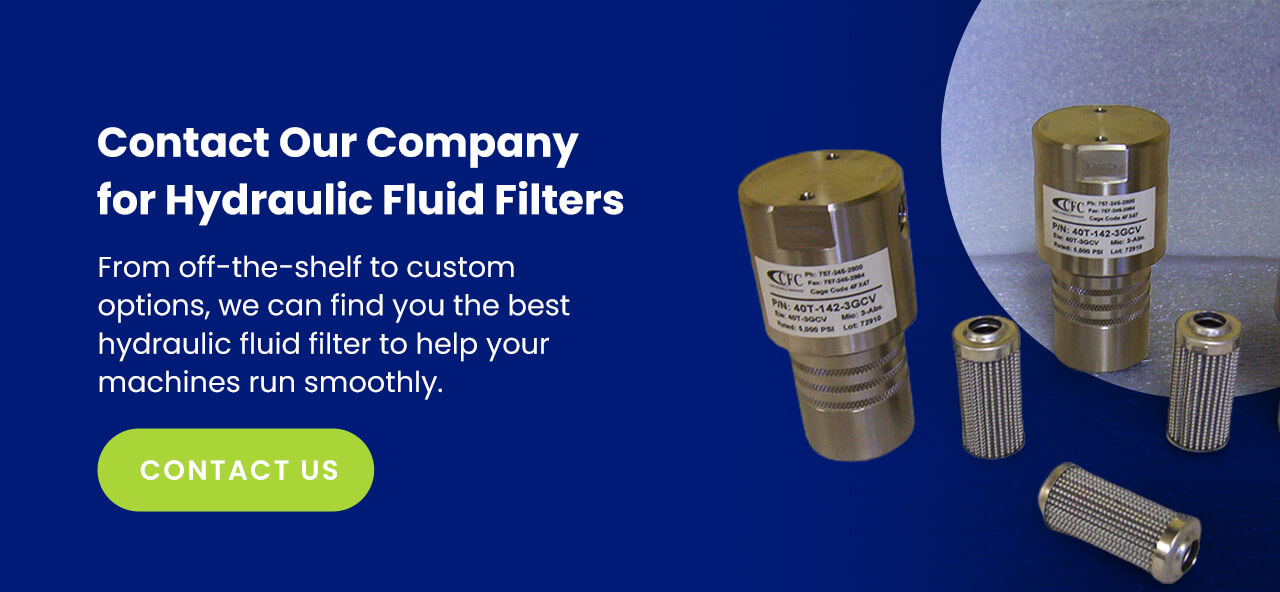March 3, 2025
Hydraulic Fluid Filtration & How to Maintain Hydraulic Fluid Filtration Systems

Jump To:
- What Are Hydraulic Filters?
- Hydraulic Fluid and Contamination
- How Do Fluid Contaminants Affect Hydraulics?
- Hydraulic Fluid Filtration
- How Hydraulic Fluid Filtration Works
- How to Maintain Hydraulic Fluid Systems
One of the best ways to maintain hydraulic filtration systems is to manage and clean your hydraulic fluid.
Hydraulic systems are used in many industries, from aerospace to robotics. Regardless of the market or application, hydraulic systems need special care to continue operating.
What Are Hydraulic Filters?
Hydraulic filters remove particulates from the hydraulic fluid. The hydraulic filter removes the contaminants to prevent them from flowing downstream, harming other components and causing system failures. Contaminants can include dirt, sand, rust, rubber byproducts, silt, debris and water.
If particulates circulate through the hydraulic system, they could cause damage to the hydraulic system and other equipment. Though the particulates are often too small to see with the human eye, hydraulic filters can easily remove particles as small as one micron absolute, ensuring system cleanliness while maximizing functionality.
Hydraulic Fluid and Contamination
Hydraulic fluid brings life to the hydraulic systems and keeps the machinery running. When the fluid becomes contaminated, the hydraulic system sustains damage, or the connected equipment experiences wear and tear.
A hydraulic filter has one main function. By keeping the hydraulic fluid clean, the filter prevents the system from overheating by reducing the amount of wear and friction.
Perhaps one of the most important functions is lubrication. Though often overlooked, lubrication is essential to a smoothly operating hydraulic system. In hydraulic machines, moving parts create friction, resulting in decreased machine performance or total equipment failure. Lubrication creates a cushion between the moving parts and helps prevent extensive friction and damage. Especially in new machines, lubrication helps sensitive machinery move smoothly.
How Do Fluid Contaminants Affect Hydraulics?
Contaminants and particulates can harm the hydraulic system. Particulates remain the main focus of hydraulic filters, catching and containing harmful particles so small the human eye can’t detect them. Measured in microns, particulates often cause damage to the system, especially if they infiltrate through machinery or fluid.
Particles may include dirt, grit or sand. They are often made through the equipment’s natural movements, degraded seals, touching components or while adding new fluid. When the contaminants accumulate, the machine could experience wear and tear, leading to more particulates in the fluid as the parts break down. One of the best ways to prevent leftover particulates from entering the fluid is to flush new equipment before usage.
Hydraulic Fluid Filtration
Hydraulic fluid filtration helps to keep your hydraulic system functioning throughout the day. Remember to familiarize yourself with the inner workings of hydraulic filters to understand how to clean and maintain them. An active filter can help keep your machinery running longer and working better.
How Hydraulic Fluid Filtration Works
Hydraulic fluid filtration helps keep your system running smoothly. The filter allows fluid to pass through the equipment after particulate removal. As the fluid passes through the filter element, the filter catches any extra particles or contaminants that could cause damage to your machine.
When the filter is clean and workable, fluid can easily pass through the system, but a clogged filter can cause damage and wear and tear to your equipment. Remember that over time your filter will become filled with debris and dirt and need to be cleaned or replaced. Cleaning the filter is one of the most critical parts of hydraulic filter maintenance. Learning the different types of hydraulic filters is also essential to understand how each one operates and their cleaning needs.
The types of hydraulic fluid filters include:
- Suction filters: Suction filters are located outside or inside of the reservoir. Placed near the pump inlet, the suction filter helps prevent harmful particles and contaminants from entering the pump. Because the pump connects to the rest of the hydraulic system, a functioning suction filter helps reduce the chance that particles will enter the rest of the system.
- Return filters: Hydraulic fluidenters the reservoir after flowing through the system. A return filter helps capture loose particles that may have been produced by the system from the machine’s moving parts. The filter prevents particles from entering the reservoir and the hydraulic fluid again.
- Pressure filters: Pressure filters are often placed downstream of the pump. These filters help capture particulates made by the pump and atypes re important filters for individual component protection.
- Duplex filters: A duplex filter combines the features of pressure and return filters. They often come with two different chambers and allow your workers to change filters without interrupting the flow of the machine.
- Off-line filters: An off-line filter works independently of the hydraulic system. It contains separate pump and plumbing components as well. Chase Filters & Components offers three types of off-line filters — a handheld for adding fluid to your system, a filter panel that mounts on the exterior of the system and a portable filter cart that can be used on multiple systems.
How to Maintain Hydraulic Fluid Systems
Hydraulic filtration maintenance involves several critical steps that employees should familiarize themselves with. You and your team must maintain the filter often to prevent excessive damage to your important machines. From cleaning to replacing filters to keeping accurate records, the three maintenance steps ensure your hydraulic systems remain long-lasting and durable for years to come.
1. Always Use Clean Fluid
Step one involves using clean fluid at all times. Make sure you use fluid that is free of contaminants or particles. Otherwise, your hydraulic system could break down. Hydraulics are not meant to handle dirty fluid, and many may stop working altogether if you introduce fluid that contains particles from the outset. Remember that new oil is not yet clean and should always be filtered before adding it to your system.
New machines are especially prone to damage and need clean fluid to work efficiently. Clean fluid helps prevent clogged filters and system damage and helps your filter system preserve the clean fluid for a longer time.
2. Change and Clean Filters
Step two requires that you change and clean your filter often. Because fluid will always pass through the filter and may often contain contaminants and particles, your filter is bound to become full after a time. The more particles caught in the system means less fluid will be able to pass through and could cause flow restrictions and breakdowns.
A clogged filter often leads to increased differential pressure, affecting the system’s performance. Many filters use an indicator or electronic monitoring system to tell you when to clean or replace your filter. You can also find the manufacturing instructions or read the system’s manual to determine when they recommend cleaning and replacing your filters.
3. Keep Maintenance Records
For step three, always keep an accurate record of your hydraulic filters. It is best to keep notes during maintenance checks and look for indicators of damage or clogged filters should the need for other repairs arise. An excellent record-keeping process can keep your filters running at peak efficiency throughout the year.
Contact Our Company for Hydraulic Fluid Filters
At Chase Filters & Components, we serve dedicated professionals and companies in aerospace, defense, chemical processing, manufacturing, extraction and oil. Since establishing our company in 2006, we’ve become a leader in filters for oxygen, hydraulic, pneumatic, coalescing, strainer, valve and off-line filtering options.
With more than 30 years of experience in the industry, we’ve developed several filter types to fit your needs. From off-the-shelf to custom options, we can find you the best hydraulic fluid filter to help your machines run smoothly. Contact us today to speak to a representative or call us at (757)-327-0036.

